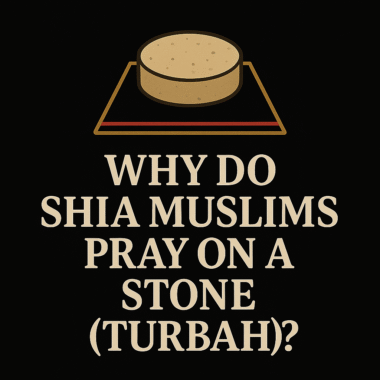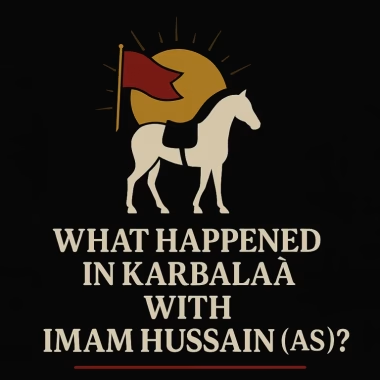Shia Islam is one of the two main branches of Islam, meaning the followers (Shīʿa) of Imam Ali (AS), cousin and son-in-law of the Prophet Muhammad ﷺ. Shia Muslims believe that after the Prophet ﷺ, divine leadership (imamate) was entrusted to the Ahl al-Bayt (AS), the family of the Prophet ﷺ. This belief is rooted in the Qur’an and the sayings of the Prophet ﷺ found in both Sunni and Shia sources.
Explanation
The word Shia (شيعة) literally means “followers” or “partisans.” From the earliest days of Islam, it referred to those who upheld Imam Ali (AS) as the divinely appointed successor to the Prophet ﷺ. The Prophet ﷺ himself instructed the Ummah to hold firmly to two weighty trusts: the Qur’an and his Ahl al-Bayt (AS), ensuring that guidance would always remain with them.
Evidence
Qur’an (33:33)
Arabic:
«إِنَّمَا يُرِيدُ ٱللَّهُ لِيُذۡهِبَ عَنكُمُ ٱلرِّجۡسَ أَهۡلَ ٱلۡبَيۡتِ وَيُطَهِّرَكُمۡ تَطۡهِيرًا»
Transliteration:
Innamā yurīdu ’llāhu liyudhhiba ʿankumu ’r-rijsa ahla ’l-bayti wa yuṭahhirakum taṭhīrā
English:
“Indeed, Allah only intends to remove from you impurity, O People of the House (Ahl al-Bayt), and to purify you completely.”
📖 Reference: Qur’an 33:33 (King Fahd Complex, Sahih International translation)
Qur’an (42:23)
Arabic:
«قُل لَّآ أَسۡـَٔلُكُمۡ عَلَيۡهِ أَجۡرًا إِلَّا ٱلۡمَوَدَّةَ فِي ٱلۡقُرۡبَىٰ»
Transliteration:
Qul lā asʾalukum ʿalayhi ajran illā ’l-mawaddata fī ’l-qurbā
English:
“Say: I do not ask you for any reward except love for [my] near relatives (Ahl al-Qurbā).”
📖 Reference: Qur’an 42:23 (King Fahd Complex, Sahih International translation)
Hadith al-Thaqalayn (The Two Weighty Things)
Arabic:
«إِنِّي تَارِكٌ فِيكُمُ الثَّقَلَيْنِ: كِتَابَ اللَّهِ وَعِتْرَتِي أَهْلَ بَيْتِي، مَا إِنْ تَمَسَّكْتُمْ بِهِمَا لَنْ تَضِلُّوا بَعْدِي أَبَدًا»
Transliteration:
Innī tārikun fīkum al-thaqalayn: kitāba ’llāhi wa ʿitratī ahla baytī, mā in tamassaktum bihimā lan taḍillū baʿdī abadan
English:
“I am leaving among you two weighty things: the Book of Allah and my family — my Ahl al-Bayt. If you hold fast to them, you will never go astray after me.”
- Ṣaḥīḥ Muslim 2408 (Zayd b. Arqam): mentions Qur’an and Ahl al-Bayt together at Khumm (without the “if you hold fast” clause).
📖 Reference: Ṣaḥīḥ Muslim, Kitāb Faḍāʾil al-Ṣaḥābah, ḥadīth 2408 - Jāmiʿ al-Tirmidhī 3786 / Musnad Aḥmad: record the full wording including “if you hold fast to them, you will never go astray.”
📖 Reference: Jāmiʿ al-Tirmidhī, Kitāb al-Manāqib, ḥadīth 3786; Musnad Aḥmad, ḥadīth 11104 (Dar al-Fikr edition)
➡️ Nuance: The “if you hold fast … you will never go astray” clause is explicit in Tirmidhī, while Aḥmad preserves closely related wordings — emphasising that the Qur’an and Ahl al-Bayt will not separate until they meet the Prophet ﷺ at the ḥawḍ.
- Shia source: al-Kāfī records several versions of this hadith.
📖 Reference: al-Kulaynī, al-Kāfī, vol. 1, p. 430; vol. 2, p. 415
Conclusion / Summary
Shia Islam is defined by loyalty to the Ahl al-Bayt (AS) alongside the Qur’an. This is rooted in explicit Qur’anic verses and in Hadith al-Thaqalayn, which Sunni and Shia sources both transmit with slight wording differences.
Quick FAQ
Q: Is Shia Islam a separate religion?
No. It is one of the two main branches of Islam, grounded in the Qur’an and Sunnah, with emphasis on the Ahl al-Bayt (AS).
Q: Why emphasise the Ahl al-Bayt (AS)?
Because the Prophet ﷺ coupled the Qur’an with his Ahl al-Bayt in his final guidance (Hadith al-Thaqalayn).
Q: Does this mean a different Qur’an?
No. Shia and Sunni Muslims share the same Qur’an. Differences lie in interpretation, not in text.
1b) Was Shia Islam present in the time of the Prophet ﷺ?
Yes. The term Shia (followers) was used during the Prophet’s ﷺ time. Classical tafsīr and hadith works preserve narrations in which the Prophet ﷺ applied Qur’an 98:7 (“the best of creatures”) to Imam ʿAlī (AS) and his Shia. Scholars vary on the grading of these reports, but they are present in Sunni and Shia sources alike.
Explanation
The Qur’an honours the Ahl al-Bayt (AS) and classical commentary connects certain verses to them. Tafsīr works under 98:7 contain reports where the Prophet ﷺ explicitly said: “It is you, O ʿAli, and your Shia.” Other narrations state: “ʿAli is the best of creatures”, and “You and your Shia will come well-pleased and pleasing.” These are found in Sunni sources like al-Ṭabarī, al-Suyūṭī, and al-Ḥākim al-Ḥaskānī, and in Shia collections.
Evidence
Qur’an (98:7)
Arabic:
«إِنَّ ٱلَّذِينَ ءَامَنُوا۟ وَعَمِلُوا۟ ٱلصَّـٰلِحَـٰتِ أُو۟لَـٰٓئِكَ هُمْ خَيْرُ ٱلْبَرِيَّةِ»
Transliteration:
Inna ’lladhīna āmanū wa ʿamilū ’ṣ-ṣāliḥāt ūlāʾika hum khayru ’l-bariyyah
English:
“Indeed, those who believe and do good — they are the best of creatures.”
📖 Reference: Qur’an 98:7 (King Fahd Complex, Sahih International translation)
Tafsīr al-Ṭabarī (under 98:7)
Arabic:
«هُوَ أَنْتَ يَا عَلِيُّ وَشِيعَتُكَ»
Transliteration:
Huwa anta yā ʿAlī wa shīʿatuka
English:
“It is you, O ʿAli, and your Shia.”
📖 Reference: Tafsīr al-Ṭabarī, under Q 98:7 (KSU Quran Project / tafsir.app)
Al-Suyūṭī, al-Durr al-Manthūr (under 98:7)
Arabic:
«هَذَا أَنْتَ وَشِيعَتُكَ، يَا عَلِيُّ، وَمَوْعِدِي وَمَوْعِدُكُمُ الْحَوْضُ، إِذَا جَاءَتِ الْأُمَمُ بِأَعْمَالِهَا جِئْتَ أَنْتَ وَشِيعَتُكَ رَاضِينَ مَرْضِيِّينَ»
Transliteration:
Hādhā anta wa shīʿatuka, yā ʿAlī, wa mawʿidī wa mawʿidukum al-ḥawḍ, idhā jāʾat al-umam bi-aʿmāli-hā jiʾta anta wa shīʿatuka rāḍīna marḍiyyīn
English:
“This means you and your Shia, O ʿAli. Our meeting place will be at the Pond (al-Ḥawḍ). When the nations are brought with their deeds, you and your Shia shall come well-pleased and pleasing.”
Arabic (another narration):
«إِنَّ عَلِيًّا هُوَ خَيْرُ الْبَرِيَّةِ»
Transliteration:
Inna ʿAliyyan huwa khayru ’l-bariyyah
English:
“Indeed, ʿAli is the best of creatures.”
📖 Reference: al-Suyūṭī, al-Durr al-Manthūr, under Q 98:7 (GreatTafsirs.com edition)
Shawāhid al-Tanzīl (al-Ḥākim al-Ḥaskānī)
Arabic:
«إِنَّ الَّذِينَ آمَنُوا وَعَمِلُوا الصَّالِحَاتِ أُوْلَئِكَ هُمْ خَيْرُ الْبَرِيَّةِ، هُوَ عَلِيٌّ وَشِيعَتُهُ»
Transliteration:
Inna ’lladhīna āmanū wa ʿamilū ’ṣ-ṣāliḥāt, ūlāʾika hum khayru ’l-bariyyah, huwa ʿAlī wa shīʿatuhu
English:
“Indeed, those who believe and do good — they are the best of creatures. This refers to ʿAli and his Shia.”
📖 Reference: al-Ḥākim al-Ḥaskānī, Shawāhid al-Tanzīl, under Q 98:7
➡️ Nuance: These reports are preserved in classical Sunni works (al-Ṭabarī, al-Suyūṭī, al-Ḥaskānī), but scholars differ on the strength of their chains. Some regard them as weak in isnād, while others cite them in manāqib (virtues) literature. Their presence is undisputed.
Conclusion / Summary
Shia Islam, far from being a later invention, is anchored in the Qur’an and the Prophet’s ﷺ own sayings. Reports connecting Qur’an 98:7 to Imam ʿAlī (AS) and his Shia appear in respected Sunni sources such as al-Ṭabarī, al-Suyūṭī, and al-Ḥākim al-Ḥaskānī, alongside Shia collections.
Quick FAQ
Q: Is the term “Shia” used by the Prophet ﷺ?
Yes. Reports with this wording are transmitted in classical sources (e.g., Tafsīr al-Ṭabarī, al-Durr al-Manthūr). Scholars discuss their chain strength, but the term and its application to Imam ʿAlī (AS) and his followers are recorded.
Q: Does recognising Shia mean rejecting other Muslims?
No. It affirms the Qur’anic and Prophetic status of the Ahl al-Bayt (AS) while recognising the broader Ummah.
References
- The Qur’an — King Fahd Complex / Quran.com (Sahih International translation).
- Ṣaḥīḥ Muslim — Kitāb Faḍāʾil al-Ṣaḥābah, ḥadīth 2408.
- Jāmiʿ al-Tirmidhī — Kitāb al-Manāqib, ḥadīth 3786.
- Musnad Aḥmad ibn Ḥanbal — ḥadīth 11104 (Dar al-Fikr edition; numbering varies).
- al-Kulaynī, al-Kāfī — vol. 1, p. 430; vol. 2, p. 415 (Dar al-Kutub al-Islāmiyya edition).
- Tafsīr al-Ṭabarī — commentary on Qur’an 98:7 (King Saud University Quran Project / tafsir.app).
- al-Suyūṭī, al-Durr al-Manthūr — commentary on Qur’an 98:7 (GreatTafsirs.com edition).
- al-Ḥākim al-Ḥaskānī, Shawāhid al-Tanzīl — commentary on Qur’an 98:7.










